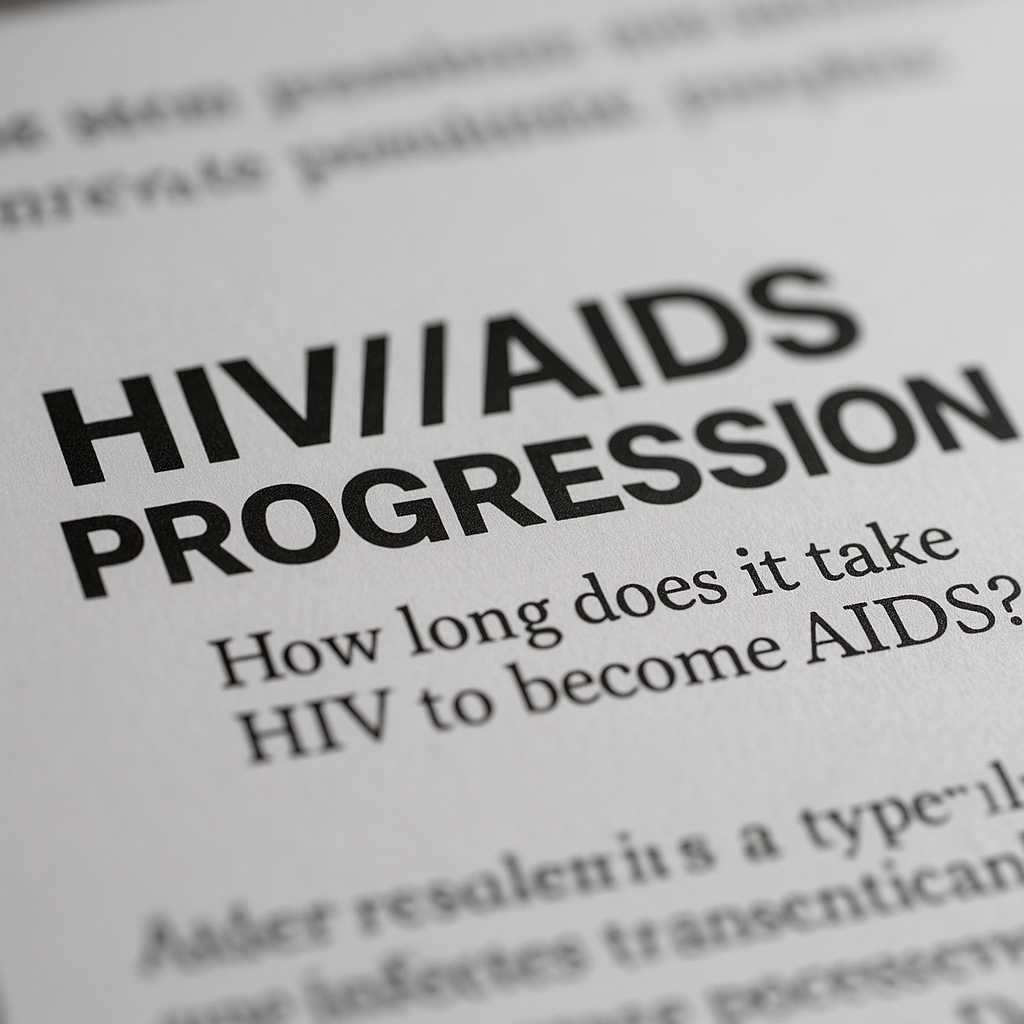When someone tests positive for HIV, one of the first questions that often comes up is: how long does it take for HIV to become AIDS? It’s a vital question—and the answer depends on several factors including health, lifestyle, and access to treatment. While HIV is a lifelong condition, its progression to AIDS is not inevitable, especially with modern medicine.
Table of Contents
- Understanding the Stages of HIV
- Typical Timeline from HIV to AIDS
- Factors That Influence HIV Progression
- How Treatment Affects the HIV Timeline
- FAQs
- Conclusion
Understanding the Stages of HIV
HIV, or human immunodeficiency virus, weakens the immune system by attacking CD4 cells. If left untreated, it progresses through three main stages:
1. Acute HIV Infection: This occurs 2 to 4 weeks after exposure. People may experience flu-like symptoms or no symptoms at all. During this stage, the virus replicates rapidly.
2. Chronic HIV Infection (Clinical Latency): Often called asymptomatic HIV, this stage can last for years. The virus is still active but reproduces at lower levels. Without treatment, most people remain in this phase for 8 to 10 years.
3. Acquired Immunodeficiency Syndrome (AIDS): This is the most advanced stage, where the immune system is severely damaged. People are vulnerable to opportunistic infections and certain cancers.
Typical Timeline from HIV to AIDS
Without treatment, it usually takes about 8 to 10 years for HIV to progress to AIDS. However, some individuals may progress more quickly—within a few years—while others may take much longer. A small percentage, known as “long-term non-progressors,” can live with HIV for 15 years or more without developing AIDS.
The timeline is not the same for everyone. Variations in genetics, overall health, and the specific strain of HIV can all affect how fast the virus advances.
Factors That Influence HIV Progression
Several key elements can accelerate or slow the progression from HIV to AIDS:
1. Access to Medical Care: Those with access to regular care and antiretroviral therapy (ART) are less likely to develop AIDS.
2. Lifestyle Choices: Smoking, poor nutrition, and substance abuse can weaken the immune system and hasten HIV progression.
3. Co-infections: Other infections like hepatitis, tuberculosis, or sexually transmitted diseases can complicate the immune system’s response.
4. Genetics: Some people carry genetic factors that slow down HIV’s impact on the body.
It’s important to remember that HIV doesn’t follow a strict timeline. That’s why regular monitoring and early diagnosis are so crucial.
How Treatment Affects the HIV Timeline
Thanks to modern medicine, particularly antiretroviral therapy (ART), most people living with HIV will never develop AIDS. ART works by lowering the viral load to undetectable levels, allowing the immune system to remain strong and healthy.
People who start treatment early and adhere to it consistently can live long, healthy lives with HIV. In fact, with the right care, life expectancy for someone with HIV can be nearly the same as for someone without it.
Ongoing education and outreach from platforms like eHealthcare Solutions help ensure that more people understand the importance of early treatment and regular check-ups.
Conclusion
So, how long does it take for HIV to become AIDS? Without treatment, the average timeline is about 8 to 10 years—but this can vary widely. The good news is that with early diagnosis and proper medical care, most people can prevent HIV from ever reaching the AIDS stage.
Timely treatment, healthy living, and regular medical check-ups make all the difference. Remember, an HIV diagnosis is not a death sentence. With the right support and resources, individuals can live full, meaningful lives without progressing to AIDS.
FAQs
Can HIV turn into AIDS immediately?
No. It typically takes years for HIV to progress to AIDS without treatment. However, early treatment can prevent it entirely.
Does everyone with HIV eventually get AIDS?
Not anymore. With modern antiretroviral therapy, most people with HIV will never develop AIDS.
How do I know if I’m progressing to AIDS?
Symptoms like weight loss, fatigue, and frequent infections may suggest AIDS. However, only a healthcare provider can make that diagnosis.
Can you recover from AIDS once you reach that stage?
While AIDS cannot be reversed, people can improve their immune function significantly with consistent treatment.
Is it possible to live a normal life with HIV?
Yes. With proper treatment and care, many people with HIV live long, healthy lives.
This content is not medical advice. For any health issues, always consult a healthcare professional. In an emergency, call 911 or your local emergency services.




